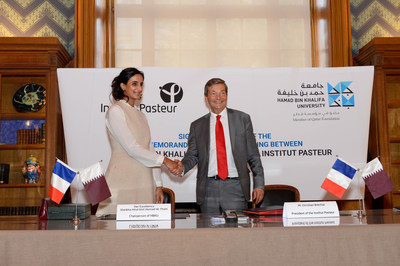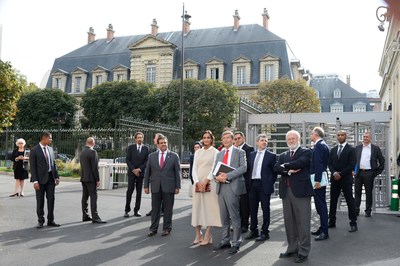Institut Pasteur Signs MoU with Qatar's Hamad Bin Khalifa University to Collaborate on Disease Prevention and Genomics Research
PARIS, September 29, 2017 /PRNewswire/ --
Hamad Bin Khalifa University (HBKU), a member of Qatar Foundation for Education, Science and Community Development, and the Institut Pasteur signed a Memorandum of Understanding (MoU) in Paris on Friday, announcing a new partnership to work closely in the field of biomedical research. The two research intensive entities will collaborate in the fields of academics, research, teaching and knowledge sharing. The agreement was signed by Her Excellency Sheikha Hind bint Hamad Al Thani, Chairperson of Hamad Bin Khalifa University, Vice-Chairperson and CEO of Qatar Foundation, and Dr. Christian Bréchot, President of Institut Pasteur at a ceremony held in Paris' on September 29, 2017 at Salle des Actes, Institut Pasteur.
(Photo: http://mma.prnewswire.com/media/564609/H_E_Sheikha_Hind.jpg )
(Photo: http://mma.prnewswire.com/media/564610/Guided_Tour_of_Institut_Pasteur.jpg )
His Excellency Dr. Khaled Al Mansouri, Qatar's Ambassador to France, Dr. Ahmad M. Hasnah, President of HBKU, along with senior official from both institutions, were in attendance at the ceremony.
H.E. Sheikha Hind commented on the new partnership saying: "Hamad Bin Khalifa University has consistently and diligently played a prominent role in promoting and facilitating innovation, scientific research and academic excellence, in Qatar with the aspiration of global impact. We firmly believe that our commitment to being a global leader in innovation and education has yielded numerous achievements since our inception.
"Today, with this new partnership with the Institut Pasteur, our researchers, scholars, academics and students will be further emboldened to facilitate ground-breaking discoveries in healthcare, biomedical sciences, and genomics."
HBKU's commitment to being an innovation-driven research university, addressing the critical challenges facing the world, has been rapidly ramping up over the years. Being home to research centers like the Qatar Biomedical Research Institute (QBRI) and the College of Health and Life Sciences as well as working with local and international partners, the University is aiming to become a key player in healthcare and research in the region.
Named after the renowned Louis Pasteur, the Institut Pasteur brings with it 130 years of breakthrough discoveries in preventing and treating infectious diseases. With ten Nobel laureates, the Institute's contributions to field of medicine and physiology are innumerable. Today, the 130 research units of its Parisian campus site continue to make contributions of global impact to biomedical research.
"As Qatar Foundation's homegrown university, innovation is at the core of HBKU's values. Inspired by this and driven by the spirit of collaboration, the University has developed a dynamic ecosystem, contributing to knowledge and science, with global impact," Sheikha Hind added.
"One of the Institut Pasteur's fundamental missions is to bring its expertise to support capacity building in biomedical research through training and education. The Institut Pasteur has been involved one year ago in training medical professionals from the Qatar ministry of health by organizing an intensive outbreak investigation course in Doha. The signing of the agreement with HBKU enlarges the frame of the partnership to higher education and research institutions led by Qatar Foundation. Hence, it will include in addition to infectious diseases the research on most prevalent chronic diseases in the region like diabetes, cancer, neurodegenerative and genetic diseases, particularly in the context of the successful Qatari genome project" said Pr. Christian Bréchot, President of the Institut Pasteur.
His Excellency Dr. Khaled Al Mansouri, Qatar's Ambassador to France commented on the MoU saying: "Qatar continues to remain steadfast in its commitment towards the country's human development goals, as laid out in the Qatar National Vision 2030. Qatar aims to enhance its cooperation and partnership with France in different fields and partnerships such as this one with the internationally recognized Institut Pasteur and HBKU are a testament to Qatar's role in strengthening its collaborations that foster knowledge sharing and cooperation. We are proud to have our homegrown university partner with the Institut, to work together on the pressing challenges the world faces in the field of disease prevention and genomics
His Excellency Eric Chevallier, Ambassador of France to the State of Qatar declared "The MoU signed by Her Excellency Sheikha Hind bint Hamad Al Thani, Chairperson of Hamad Bin Khalifa University, Vice-Chairperson and CEO of Qatar Foundation and by Professor Christian Bréchot, President of Pasteur Institute of Paris, in the presence of Dr Ahmad M. Hasnah, President of Hamad Bin Khalifa University, member of the Qatar Foundation, is the achievement of the impulse given by Her Highness Sheikha Mozah bint Nasser, Founder and Chairperson of Qatar Foundation, just a few months ago. This partnership demonstrates again the strong ties between France and Qatar in the domains of education and research. I am convinced this partnership will enrich both entities with academic experience and innovative research, not only in infectious disease, but also in other domains, such as genomics and genetics. I am proud of this signature because it was a priority of my term in Qatar and because we all have worked hard at the French Embassy for this project."
The MoU between HBKU and Institut Pasteur will see a close collaboration in joint research and academic collaboration in the areas of genomics and precision medicine. The partnership will have students, researchers and scientists between from both entities working together on research projects as early as 2018.
The agreement will also see faculty and PhD students from the two institutions exercise more mobility between the campuses, for teaching and research. Beyond academics, they will actively work towards strengthening the healthcare infrastructure in Qatar, and build towards achieving the Qatar National Vision 2030. HBKU and Institut Pasteur will organize and facilitate conferences, seminars, workshops and trainings to raise awareness and inspire the coming generations of scientists in the field of genomics and the prevention of infectious disease and other research areas.
About Hamad Bin Khalifa University
Hamad Bin Khalifa University (HBKU), a member of Qatar Foundation for Education, Science and Community Development, is an emerging research university that is building its foundation upon unique collaborations with local and international partners. Located in Education City, HBKU delivers undergraduate and graduate programs through its College of Science and Engineering, College of Law and Public Policy, College of Health and Life Sciences, College of Islamic Studies, and its College of Humanities and Social Sciences. It also provides unparalleled opportunities for research and scholarship through its research institutes, and its Executive Education Center delivers customized programs for the business community of Qatar and the region, in line with Qatar National Vision 2030.
About the Institut Pasteur
The Institut Pasteur, a private foundation with officially recognized charitable status set up by Louis Pasteur in 1887, is today an internationally renowned center for biomedical research at the heart of a network of 33 institutes worldwide. In the pursuit of its mission to prevent and fight against diseases in France and throughout the world, the Institut Pasteur operates in four main areas: scientific and medical research, public health and health monitoring, teaching, and business development and technology transfer. More than 2,500 people work on its Paris campus. The Institut Pasteur is a globally recognized leader in infectious diseases, microbiology, and immunology. Its 130 units also focus their research on certain cancers, genetic and neurodegenerative diseases, genomics and developmental biology. This research aims to expand our knowledge of living organisms in a bid to lay the foundation for new prevention strategies and novel therapeutics. Since its inception, 10 Institut Pasteur scientists have been awarded the Nobel Prize for Medicine, including two in 2008 for the 1983 discovery of the human immunodeficiency virus (HIV) that causes AIDS.


Share this article